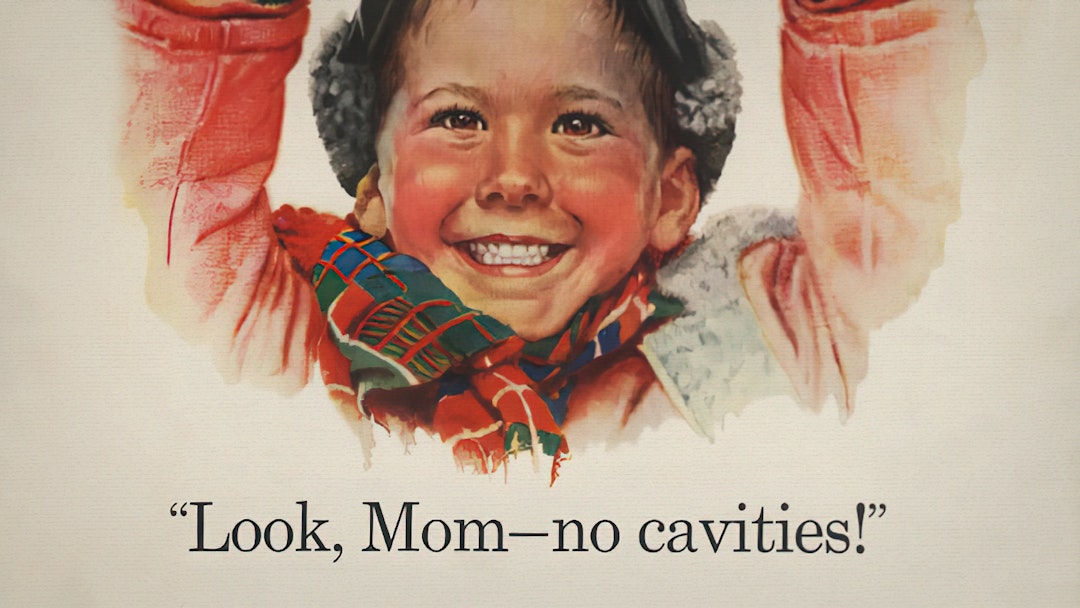Can you make a free purchasing choice, without any substantial influence from promotional tactics?
Let’s imagine what it would look like.
Say you want to buy some toothpaste.
To be free of influence, you’ll need to forget all the advertising you’ve ever seen.
Luckily for our example, you recently had a nervous fit and have forgotten every toothpaste brand and ad (along with who you are).
But the moment you see a toothpaste brand again, its clever name and packaging design will start working on you. Brands are marketing contraptions designed to sway choice, and we can’t allow that. So here’s what you do.
To avoid being influenced by branding, you’ve asked a good friend to go to the supermarket on your behalf. She’s on the phone to you right now.
“There are ten brands,” she says. “Let’s call them Toothpastes A to J.”
So far, so good. But how do you choose which one? You want to make a free choice, not a random one.
What does it cost?

“My budget is £2,” you say. “What can I get for that? Wait — stop!”
You realised just in time. When decisions are driven by price, either you accept the suggestion that a more expensive product is better, and you end up spending more; or you’re a shrewd saver, and you end up spending less. Either way, the marketer has sold you a product just by giving it a price.
What’s the difference between a £1.50 toothpaste and a £2 toothpaste? The most important difference is 50p. Price isn’t determined by the product – it’s determined by the customers whose money you want.
In this case, let’s just say all the options cost £2.
What are you buying?
“I want the best toothpaste for my money,” you say. Now we’re getting somewhere, you think: I’m being objective.
“Well…” your friend replies. “Some say they’ll whiten your teeth, some will freshen breath, and others taste great. Toothpaste A says it’s does all three.”
“Then I’ll have Toothpaste A!” you declare. “Wait — stop!”
Won’t all toothpastes taste pleasant enough? Won’t they all freshen breath and make teeth whiter, simply by virtue of cleaning your teeth? The only difference you’re really considering now is which feature the brand has emphasised in the marketing text on its packet. And the “3-in-1” message appealed the most to your analytical personality.
But if you can’t trust what the brand says about itself, what can you trust? With products like toothpaste, there’s at least one section on the box that’s objective.
What are you really buying?
“The ingredients!” you cry. “I want you to thoroughly research each chemical. Then tell me the features of each toothpaste based on the science.”
Your friend (now deeply regretting her offer to help after your nervous fit) happens to be a whizz at mobile research. Within minutes, she reports back.
“They all do much the same,” she explains. “Some use an antibacterial agent that has question marks over its safety. Others use a harsh abrasive that wears away your gums and pollutes the environment. Toothpaste B has the most positive and fewest negative points.”
“Toothpaste B it is!” you cry, satisfied. Should you be?
Unaffected by marketing?

Three weeks later, while brushing your teeth, it hits you.
Your glass of water slips from your hand, and as it falls to the floor, you remember who you are. You’re the Marketing Manager at the company that makes Toothpaste B.
And you remember that last meeting.
“How are we going to shift as many units as possible?” you barked at your team.
“Our brand and pricing appeal to our target customers,” the executive quivers. “We’ve included ingredients in the formula that excessively whiten teeth and kill bacteria, which people are obsessed about in today’s culture.”
“And?” you scream, a vein throbbing at your temple.
“We identified the supermarket chains with the greatest number of outlets in our target regions. Given the ad spend you’ve signed off, they’ll stock our toothpaste on their shelves for 6 months.”
The glass smashes on the floor. The very options before you were themselves the result of marketing strategies, which limited your ‘free’ choices to an artificially small set that included Toothpaste B.
Why are you buying?

Feverishly, you take to the Internet. You’re going to make a free choice from among every single toothpaste manufacturer!
But somehow you end up link-hopping until you read that toothpaste doesn’t actually remove any more plaque than brushing with just water.1 Over the course of 150 years, toothpaste marketers have transmuted the luxury of brushing with a pleasant foam into an essential hygienic practice for everyone.
It was only in the 1950s that Procter & Gamble spent millions of dollars funding research2 to come up with an ingredient that actually did something – fluoride, which prevents cavities – with which they could then spend millions of dollars advertising a product with an advantage.3
Make your choice
Ultimately, if you’re buying a product, it’s because a marketer has put the right thing in front of you at the right price. And that is no bad thing.
Without marketing, nothing would ever be bought; with it, great products can find the people who really want them.
As consumers, the important thing isn’t to escape from marketing, but to understand why we’re choosing between A and B.
-
“You really do not need toothpaste to remove the dental plaque from your teeth. Purely the mechanical action of the toothbrush bristles and your dental floss disrupts the dental plaque that ultimately leads to tooth decay and gum disease. So you really don’t need toothpaste.” Are There Benefits to Using Fluride Free Toothpaste?, Dr David Okano, University of Utah Health. ↩
-
Joseph Muhler, Stannous Fluoride Toothpaste, National Inventors Hall of Fame. ↩
-
How Crest Made Business History, Harvard Business School. ↩
Are you marketing-proof?
We hope this little thought experiment made you think about how marketing really works. We’d love to hear your thoughts over on:
While you're there, drop a Like or Share if this was useful so we know to write more like it in future.
Does this article make marketing sound insidious? It shouldn’t. At least in our book, marketing is about connecting people with products that will truly benefit them. Get in touch if you need any help making that connection.

 LinkedIn
LinkedIn
 Facebook
Facebook
 Twitter
Twitter
 Medium
Medium